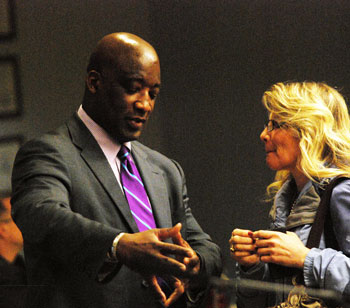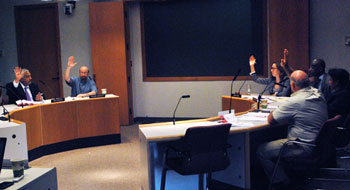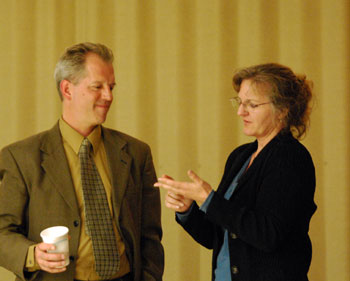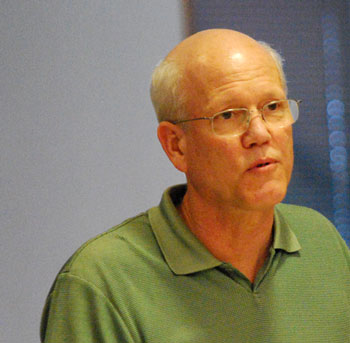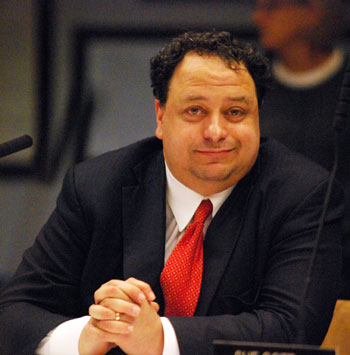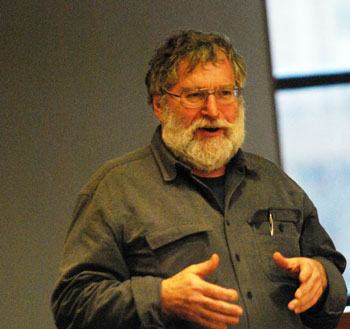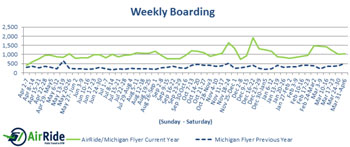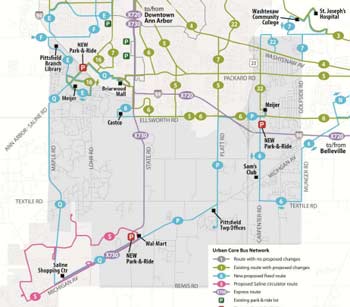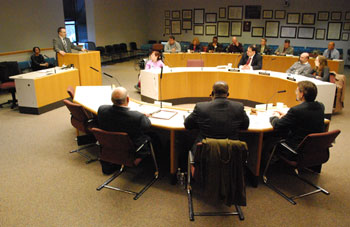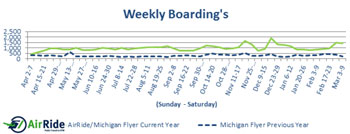Ann Arbor city council meeting (May 6, 2013 – May 13 session): In the session’s main business, the council voted 6-5 to approve a controversial 14-story residential project at 413 E. Huron. The vote came at around 9 p.m., about two hours into the session.
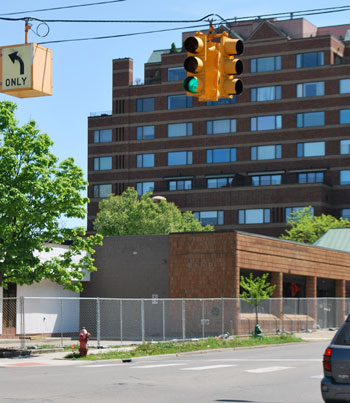
View looking northeast at Division and Huron. A chain link fence around the construction site has been installed in anticipation of construction for the 413 E. Huron project. (Photos by the writer.)
While there’d been some speculation earlier in the day that Christopher Taylor (Ward 3) would not be able to attend the May 13 session – which was a continuation of the meeting that began on May 6 – he was present for the meeting. And his support of the project was crucial in providing the six-vote majority it needed. Taylor was joined in the vote by mayor John Hieftje, Marcia Higgins (Ward 4), Margie Teall (Ward 4), Chuck Warpehoski (Ward 5) and Sally Petersen (Ward 2).
A decision on the site plan for the project, which will offer more than 200 apartments with more than 500 bedrooms, had been previously postponed on April 15, 2013, April 1, 2013 and March 18, 2013. The council recessed its May 6 meeting at around 11:30 p.m. just as it reached the 413 E. Huron site plan. So when the meeting resumed on May 13, the site plan was first on the council’s agenda.
Councilmembers who voted against site plan approval for 413 E. Huron gave pointedly specific reasons for voting no – citing traffic safety issues or failure to comply with aspects of the East Huron character district, or other aspects of the city code. It was a clear contrast to the approach a previous council had taken nearly 40 years ago in 1975, when then-councilmember Bob Faber explained his vote to deny approval of a site plan this way: “Finally, I will vote against this and I will move that the attorney and the planning director tell us why we voted no because obviously we don’t know yet and see what he can do with that in the court …” That decision had led to a losing lawsuit.
It was fear of losing a lawsuit that councilmembers cited in voting to approve the 413 E. Huron project.
After voting on the 413 E. Huron project, the council finished off the substantial number of remaining items on its agenda.
The council gave initial approval to changes to the city’s public art ordinance. The proposal includes removing the requirement that 1% of all capital project budgets be set aside for public art. Drawing some discussion from councilmembers was an additional change to which they gave preliminary approval. The additional change allows the council the flexibility to return money to its fund of origin, which might be set aside for public art in the FY 2014 budget. The council takes up the ordinance changes for final approval on June 3.
Another ordinance change to which the council gave initial approval is a change to utility improvement charges for undeveloped property. That will also appear on the council’s June 3 agenda for final approval.
In addition to initial approval of changes to those two ordinances, the council gave initial approval to rezoning of two different parcels – a property at 490 Huron Parkway and on South State Street. The property on Huron Parkway is proposed to be rezoned from R3 (townhouse district) to R1B (single-family dwelling) and would allow the currently vacant 1.22-acre site, located north of Ruthven Park, to be divided into three separate lots.
The State Street Center project is located adjacent to a new Tim Hortons restaurant, which opened last year near the intersection of State and Ellsworth. The rezoning request is from O (office) to C3 (fringe commercial). It would make the actual zoning consistent with the city’s official zoning map, which had been mislabeled. The site plan calls for demolishing a vacant 840-square-foot house and building a one-story, 1,700-square-foot building with a drive-thru Jimmy John’s restaurant facing South State Street.
An expansion to the Theta Delta Chi house on State Street near the University of Michigan campus was given quick approval after first appearing on the April 15 agenda and getting bumped to the May 6 agenda, when the council postponed all remaining items due to the late hour. The council didn’t reach the Theta Delta Chi item until the May 13 session.
And the council gave approval to two items affecting the Ann Arbor fire department – one to accept a federal grant that will pay for exhaust fume removal systems at fire stations, and another to appropriate funds to replace protective gear worn by firefighters.
The University of Michigan appeared in connection with two different agenda items. One resolution authorized a contract for the city worth more than $600,000 in connection with a vehicle-to-vehicle study – for which the UM Transportation Research Institute (UMTRI) won a $14 million federal grant. That won quick approval from the council.
The other item related to UM involved a right-of-way agreement for placing electrical conduit under Tappan Street – so that an emergency generator can serve a law school dorm. The resolution reflected a disagreement between the city and the university about whether the agreement was a transfer of land interest. The university insisted the council treat it as such a transfer, with an eight-vote majority requirement. The resolution received only seven votes, and thus failed.
Councilmembers passed two resolutions necessary to impose a special assessment on property owners along Miller Avenue, to help pay for construction of new sidewalks. And the council authorized a contract with Coca-Cola as the vendor for Ann Arbor’s city parks – but not without concern expressed by some councilmembers about the company’s human rights record and the nutritive value of soft drinks.
Receiving more discussion than they typically do were confirmations of mayoral appointments, in particular that of Eric Mahler to the board of the Ann Arbor Transportation Authority. Four councilmembers voted against Mahler, though that was still not enough to derail his appointment. Dissenters argued in part that it’s important to expand the total pool of people who are appointed to boards and commissions. Mahler has served two terms on the city planning commission. Dissenters also cited an alternate candidate, unnamed at the meeting, who was thought to be preferable to Mahler – because she would be able to represent the disability community better. The alternate candidate was LuAnne Bullington. [Full Story]




